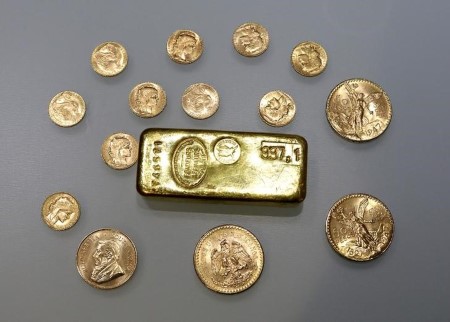




Philippines Trade Update: Imports weaken on tepid demand
 DOWNLOAD
DOWNLOAD

Policy Rate Updates: BSP outlook — cloudy with a chance of rate cut
 DOWNLOAD
DOWNLOAD

January Economic Update: Growth slows, prices rise
 DOWNLOAD
DOWNLOAD


Gold advances as dollar retreats after US jobs data

Sept 2 (Reuters) – Gold bounced over 1% on Friday as the dollar retreated after US jobs data came mostly in line with expectations, but it was still bound for a third consecutive weekly fall pressured by an elevated interest rate environment.
Spot gold rose 0.8% to USD 1,710.29 per ounce by 1:45 p.m. ET (1745 GMT). Prices were still down 1.5% for the week.
US gold futures settled up 0.8% at USD 1,722.6.
“The jobs numbers were very close to market expectations. The market is deeming it as a goldilocks number as it doesn’t suggest weakness, but is not too strong to prompt an even more aggressive Fed,” said Jim Wyckoff, senior analyst at Kitco Metals.
“Gold is kind of seeing a relief-short covering rally.”
Nonfarm payrolls increased by 315,000 jobs last month, the Labor Department said in its closely watched employment report. Economists polled by Reuters had forecast payrolls increasing 300,000.
The dollar index was down around 0.1%, making gold cheaper for overseas buyers while US Treasury yields were also lower for the day.
“A slightly weaker US dollar and US short-term Treasury yields have given gold some relief recently. However, this has not changed the underlying downward trend in gold prices,” said Capital.com analyst Piero Cingari.
Gold has been pressured off late as global central banks raise interest rates to fight soaring inflation. Higher rates increase the opportunity cost of holding the non-yielding asset.
On the technical front, prices need to break above the trendline from the March peak, currently at USD 1,770, before signalling a recovery, Saxo Bank analyst Ole Hansen said in a note.
In physical markets, gold premiums jumped in top consumer China, while a drop in local prices boosted demand in India.
Spot silver rose 0.8% to USD 17.99 per ounce, platinum was also up 0.8% at USD 834.77 per ounce, while palladium gained 0.5% to USD 2,022.43. All three metals were bound for a third straight weekly dip.
(Reporting by Ashitha Shivaprasad and Arundhati Sarkar in Bengaluru; Editing by Krishna Chandra Eluri and Shailesh Kuber)
This article originally appeared on reuters.com





 By Reuters
By Reuters